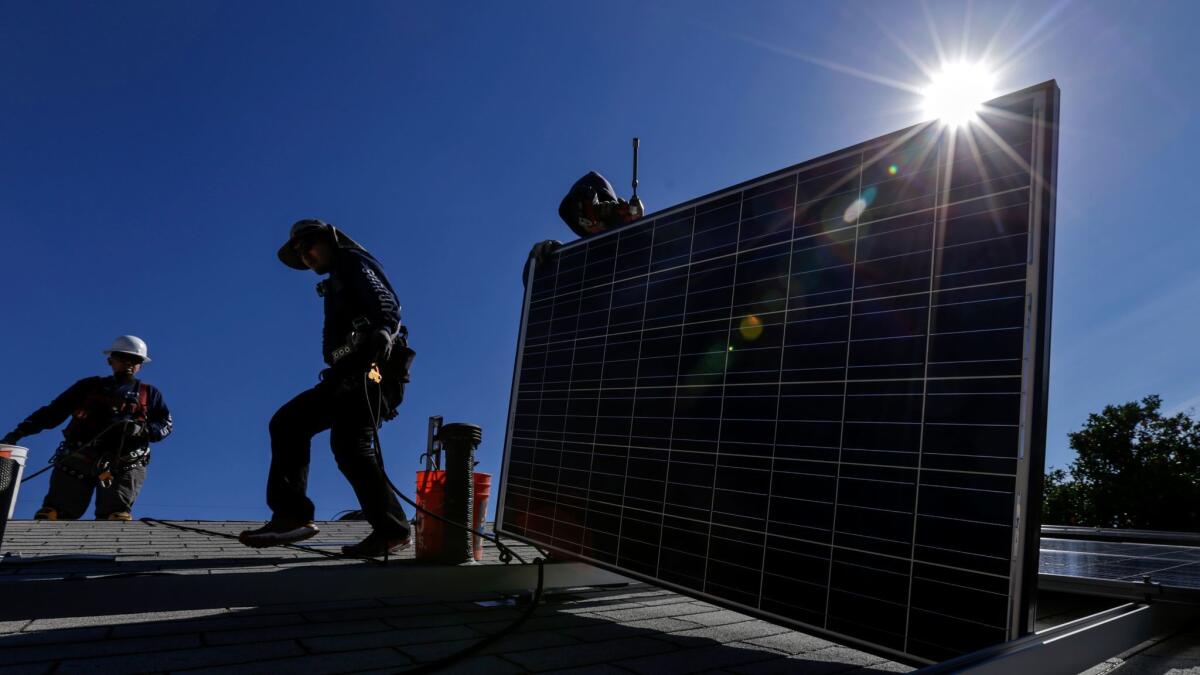With some borrowers struggling with a new kind of home-improvement loan, reforms are on the table

Business has been good for contractors whose home-improvement jobs are financed by a new program known as PACE.
Lenders eager to fund the program’s energy-efficiency projects offer contractors online tools to manage their business and sign up customers.
For example, contractors can type an address into an online portal, and if the homeowner likely qualifies, a dollar figure pops up.
That allows contractors to not only prioritize door-to-door sales by who qualified for the most funds, but allows them to pitch improvements requiring every cent.
“If they are qualified for $50,000, the contractor is going to try to sell the homeowner $50,000 worth of solar panels regardless if that house needs $50,000 worth of solar panels,” said Clark Calhoun, an attorney with Alston & Bird which is handling a case involving PACE loans.
PACE lending, hardly a blip a few years ago, is booming, in part because contractors have become enthusiastic salespeople taking advantage of participating lenders’ easy-to-use mobile and online systems. Qualifying is easy — largely based on homeowners’ equity and doesn’t take into account credit score or income.
The financing programs, formally known as Property Assessed Clean Energy, are established by governments to help homeowners pay for energy-efficient appliances and projects through loans that are paid back as line items on their property tax bills.
The programs can be a moneymaker for governments, which collect the loan payments and turn them over to the lending companies, which pay and manage the contractors.
Now, the nascent industry is running into criticism unwary homeowners are being roped into loans that they neither need nor understand.
Consequences could be dire, because if the five- to 30-year loans go unpaid, a borrower can face foreclosureas as if a mortgage weren’t paid.
Homeowners have accused contractors of misrepresenting the financing and terms of repayment, which has prompted the industry and government officials to undertake reforms. The industry’s largest lender, Renovate America in San Diego, recently decided to stop revealing to contractors how much financing a homeowner qualifies for.
Rocco Fabiano, chief executive of Petaluma-based Ygrene Energy Fund, another big PACE lender, put his company’s reform efforts this way: “This is a continuous improvement process,” he said. “Every month we are getting tighter and better.”
PACE programs got their start in 2008, when then-Gov. Arnold Schwarzenegger signed legislation authorizing municipalities to set up the special form of financing to pay for energy-efficient home improvements.
The programs got off to a slow start, but have since expanded to other states. And with residential PACE lending topping $1.5 billion nationwide in 2016, up from just $350 million two years earlier, the industry has caught the eye of regulators and legislators from Sacramento to Washington.
The California Contractors State License Board has asked the lenders to take a “more active role” to ensure contractors are properly trained as salespeople, a spokesman said.
In Congress, two bills would treat the loans more like mortgages, and last year the U.S. Department of Energy released consumer-protection guidelines, which call for tightening underwriting standards and contractor oversight.
The major private lenders say the vast majority of their customers come away happy. The industry says it’s embracing many of the reform efforts — some of which come from program proponents.
Last year, Gov. Jerry Brown signed new protections into law, including a requirement for improved, standard disclosure forms.
“The Governor continues to support PACE as a way for Californians to play their part in responding to a rapidly changing climate,” spokeswoman Ali Bay said in an email. “We’re open to additional opportunities to continue improving the program.”
California state Sen. Nancy Skinner (D-Berkeley), another supporter, has authored SB 242, a bill that would write Renovate America’s recent change into law by banning companies from revealing to contractors how much financing people were eligible for.
Skinner said that she’s heard anecdotal stories of hardship from PACE but that there have been “very few problems in California.” She said she modeled her legislation after the best-practices guidelines from the Department of Energy.
Her bill, now in the Assembly after passing the Senate last month, would also require PACE borrowers to state their income and lenders to make a “good faith determination” that a property owner has a “reasonable ability” to meet payments based on income, assets and current debt obligations.
Additionally, it would require forbearance programs to allow borrowers to catch up on delinquent loans. In some cases, lenders would have to independently verify income if an annual PACE payment reaches a particular size.
“I want PACE to grow, and if you have growth, you obviously want to make sure growth is as responsible as possible,” Skinner said.
Both Renovate America and Renew Financial, another big lender, said they support the bill and its income requirements. Renovate said it will start taking income into account later this month.
Ygrene CEO Fabiano said his company doesn’t think the income requirements are needed but supports the bill and “working with all parties” to craft good legislation.
But consumer groups say more needs to be done, and they aren’t convinced the income verification requirements are adequate.
Dipti Singh, directing attorney with pro bono law firm Bet Tzedek, said lenders still wouldn’t have to verify income for many people, including many low-income individuals and seniors on fixed income, whose annual payments would be below the threshold.
“We know from the recent foreclosure crisis that income and debt obligations can’t merely be stated — they have to be verified,” Singh said.
Though the PACE industry has been receptive to changes in California law, it strongly opposes an effort in Congress to put the loans under the federal Truth in Lending Act — a move that would treat the financing more like a mortgage and subject the lenders to oversight from the federal Consumer Financial Protection Bureau.
Upon introducing their Senate bill, Sen. Tom Cotton (R-Ark.) called PACE loans a “scam” and Sen. Marco Rubio (R-Fla.) said “residential PACE loans should have to play by the same rules as other forms of home financing.”
The Mortgage Bankers Assn. has been one of PACE’s biggest critics, because the loans are usually secured by a first lien on the property. That means the holder of the PACE loan, typically an investor who has bought a PACE bond, gets paid ahead of the mortgage holder if there is a foreclosure.
PACENation, a trade group, has characterized the Senate bill as a banking lobby effort to “kill one of America’s most successful energy-efficiency and clean-energy financing models.”
The industry says placing PACE under the Truth in Lending Act would impose burdensome regulations that would be difficult to comply with, including making contractors become licensed mortgage brokers. National organizations for local governments have pushed back as well, saying the proposed changes would hobble their ability to collect tax assessment payments for the private lenders.
A Renovate America spokesman echoed those concerns but said the company isn’t opposed to having the CFPB as a regulator.
Rep. Brad Sherman (D-Porter Ranch), who introduced a similar bill in the House, said he’s working working with PACE companies to avoid “complications.”
“I am certainly not hostile to the PACE program,” Sherman said. “It does an awful lot of good. But at the same time, people ought to know what they are getting into.”
The companies say they are already taking steps to improve consumer protections, after working with regulators and consumer groups on best practices.
For example, Renovate America launched a new contractor rating system and has removed more than 80 companies from its approved contractor list — a decision the company says led to declining revenue and layoffs announced last month.
“To the extent we find someone is not following the rules, we kick them out of the program,” said CEO J.P. McNeill.
Renovate America and Ygrene also said that in recent months they’ve started to have phone calls with all homeowners to ensure they understand the terms before taking out a loan — a Department of Energy recommendation also proposed in Skinner’s bill.
Renew Financial said it’s always called all consumers since launching its program but is more frequently sending a third party to inspect contractors’ work after a job is completed.
Cliff Staton, an executive vice president with Renew Financial, said consumer protection is a joint responsibility shared with local governments who authorized the programs and set certain standards. He said that companies like his are sometimes limited in what they can accomplish on their own.
Indeed, PACE has caused some headaches for Los Angeles County.
The county — which has partnered with Renew Financial and Renovate America — is facing a class-action lawsuit that alleges its program with Renovate America charges hidden fees and interest. Renovate America, which is also named in the lawsuit, said it finds “no merit in the allegations.”
The L.A. County Internal Services Department, which oversees the county’s PACE program, declined a request for an interview, citing pending litigation. But Scott Minnix, the department’s director, said the county has worked with private lenders to “ensure the highest standards of consumer protection and fiscal accountability.”
The Western Riverside Council of Governments, which operates one of the largest residential programs in the country and collects millions in PACE fees each year, recently intensified its review of new loan applications.
Executive Director Rick Bishop said that in addition to confirmed sales calls from lenders, the agency has started calling to confirm terms a second time with many borrowers so it could ensure they were “fully aware of this and thinking it through.”
John Rao, an attorney with the National Consumer Law Center, said he’s glad reform is underway, but was “surprised by the lack of basic consumer protections at the beginning.”
“It’s unfortunate to be playing catch-up now after so many loans have been made and so many consumers have been harmed,” he said.
Follow me @khouriandrew on Twitter







